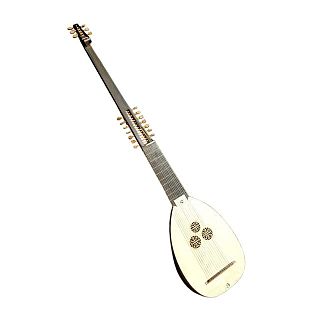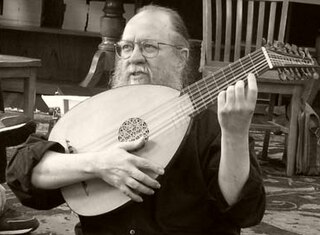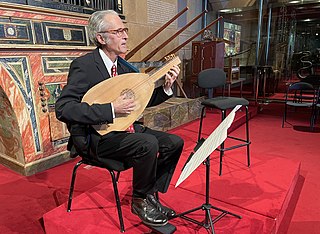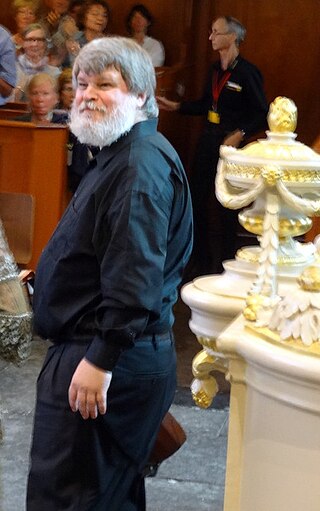
Nigel North (born 5 June 1954) is an English lutenist, musicologist, and pedagogue.

Nigel North (born 5 June 1954) is an English lutenist, musicologist, and pedagogue.
He studied guitar on a scholarship to the junior department of the Guildhall School of Music and Drama (1964–70), taking up the lute in 1969, at the age of 15. He maintains he was more or less self-taught on the instrument. He went on to study at the Royal College of Music from 1971 to 1974: classical guitar with John Williams and Carlos Bonell, viola da gamba with Francis Baines; lute (one term) with Diana Poulton, qualifying in 1974 with an A.R.C.M. diploma in lute performance. He completed his studies on the postgraduate course in Early Music at the Guildhall School of Music and Drama 1975–1975 and with one month's study with baroque lutenist Michael Schäffer in 1976.
At the age of 21, he was appointed Professor of Lute at the Guildhall School for Music and Drama, a position he held until 1996. From 1993 to 1999 he was Professor of Historical Plucked Instruments at the Hochschule der Künste, Berlin, Germany. From January 1999 he has been Professor of Lute at the Early Music Institute, Jacobs School of Music, Indiana University and, from January 2005, has taught the lute at the Royal Conservatory of The Hague, Holland.
He is internationally recognized as the foremost authority on basso continuo for plucked instruments, and has written the standard modern textbook on continuo playing on the lute and related instruments:
The following textbook is in preparation:
His recording life began in the mid-1970s; while studying at music college, he played viol, cittern, rebec and violin as well as his more usual instruments, lute, theorbo, mandolin and baroque guitar on recordings with some of the English pioneers of early music of that time, such as David Munrow with The Early Music Consort and Alfred Deller with The Deller Consort.
From 1974 to 1990 Nigel North played in baroque operas, baroque orchestras and chamber groups and accompanied singers in concerts, participating in over 100 recordings. Notable groups and people with whom he has worked:
With Andrew Manze (violin) and John Toll (harpsichord) he formed the ensemble Romanesca in 1988; they played together for the next 10 years.
His solo lute debut was a Bach programme at the Wigmore Hall in 1977; in 1985 he performed all of Bach's lute works for the first time in London. Numerous recitals and recordings followed and from 1984 to 2001 he toured worldwide.
I remember going to a remarkable recital, one which I wish I had the ability to give: it was one of Nigel North's Bach recitals, and I was bowled over by how masterful and how musical it was. A real musical experience, something you don't always get from guitar and lute players and which, in general, is pretty rare.
— Julian Bream, talk given to the Lute Society, September 2002, regarding a Bach recital given at the Wigmore Hall, 1996
He has made transcriptions for Baroque lute of Bach's complete solo violin works and solo cello suites, which he has performed at the Wigmore Hall and recorded on a 4-CD set, Bach on the Lute (1994–1998).
Other notable recordings include the complete lute works of John Dowland (4 CDs on Naxos Records), the complete lute works of Robert Johnson, as well as a critically acclaimed recording of "A Varietie of Lute Lessons," and a new series of CD's dedicated to the works of Sylvius Leopold Weiss, among many others.
This article includes a list of references, related reading or external links, but its sources remain unclear because it lacks inline citations .(December 2012) |

A lute is any plucked string instrument with a neck and a deep round back enclosing a hollow cavity, usually with a sound hole or opening in the body. It may be either fretted or unfretted.

The theorbo is a plucked string instrument of the lute family, with an extended neck and a second pegbox. Like a lute, a theorbo has a curved-back sound box with a wooden top, typically with a sound hole, and a neck extending out from the soundbox. As with the lute, the player plucks or strums the strings with one hand while "fretting" the strings with the other hand; pressing the strings in different places on the neck produces different pitches (notes), thus enabling the performer to play chords, basslines and melodies.

Patrick O'Brien was an American guitarist and lutenist born in New York. He was a recording artist, but was best known as a pedagogue in the field of early plucked instruments in America, and an expert in musicians' hand anatomy. He has worked with musicians on many instruments, reworking their technique around repetitive stress injuries and breakdowns of coordination.

Julian Alexander Bream was an English classical guitarist and lutenist. Regarded as one of the most distinguished classical guitarists of the 20th century, he played a significant role in improving the public perception of the classical guitar as a respectable instrument. Over the course of a career that spanned more than half a century, Bream helped revive interest in the lute.

Basso continuo parts, almost universal in the Baroque era (1600–1750), provided the harmonic structure of the music by supplying a bassline and a chord progression. The phrase is often shortened to continuo, and the instrumentalists playing the continuo part are called the continuo group.

Dame Carolyn Emma Kirkby, is an English soprano and early music specialist. She has sung on over 100 recordings.
Hille Perl is a German virtuoso performer of the viola da gamba and lirone. She is considered to be one of the world's finest viola da gamba players, specializing in solo and ensemble music of the 17th and 18th centuries. She has a particular interest in French Baroque repertoire for seven-string bass viola da gamba. She also performs Spanish, Italian, German, and modern repertoire for the instrument and has released many CDs.

Hopkinson Smith is an American lutenist and pedagogue, longtime resident in Basel, Switzerland.
The archlute is a European plucked string instrument developed around 1600 as a compromise between the very large theorbo, the size and re-entrant tuning of which made for difficulties in the performance of solo music, and the Renaissance tenor lute, which lacked the bass range of the theorbo. Essentially a tenor lute with the theorbo's neck-extension, the archlute lacks the power in the tenor and the bass that the theorbo's large body and typically greater string length provide.

Paul Raymond O'Dette is an American lutenist, conductor, and musicologist specializing in early music.
The Harp Consort is an international early music ensemble directed by Andrew Lawrence-King, specialising in Baroque opera, early dance-music, and historical World Music.
Lynda Sayce is a British lutenist and theorbo player, known also as a scholar of musical history and a writer on the history of the lute and theorbo.
Konrad Junghänel is a German lutenist and conductor in the field of historically informed performance, the founder and director of the vocal ensemble Cantus Cölln.
Matthew Wadsworth is an English lutenist. Wadsworth was born in Manchester with blindness. He attended a school for the visually impaired as a child, but at age 16 he became the first blind student at Chetham's School of Music in Manchester.
Charles Daniels is an English tenor, particularly noted for his performances of baroque music. He is a frequent soloist with The King's Consort, and has made over 25 recordings with the ensemble on the Hyperion label.
Eduardo Egüez is a lutenist, theorbist, and guitarist acclaimed for his interpretations of music by J.S.Bach.
Timothy Allen Burris is an American lutenist.
Jakob Lindberg is a Swedish lutenist, performing solo, in small and large ensembles, and also directing operas, using instruments of the lute and guitar families. He is known for the first ever recording of the Complete Solo Lute Music of John Dowland as well as for recording music never before recorded, with repertoire dating back to the Renaissance period.

Richard Stone is an American lutenist, music director, educator and music editor. He performs on lute and theorbo as a soloist and accompanist; he and Gwyn Roberts co-founded and co-direct Tempesta di Mare, The Philadelphia Baroque Orchestra; his musical editions are published by AR Editions and Prima la Musica; and he lectures and teaches lute, theorbo, continuo and performance practice for singers and instrumentalists at the Peabody Conservatory of The Johns Hopkins University.
Christopher Wilke is an American composer, lutenist, guitarist, recording artist, and teacher.